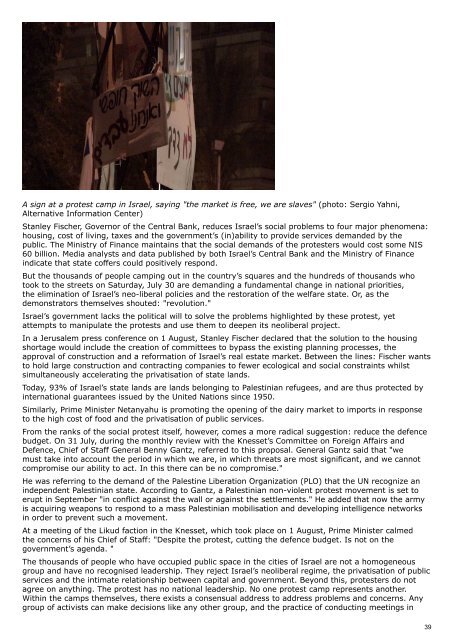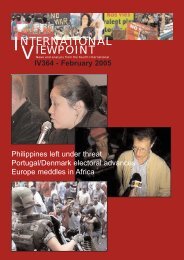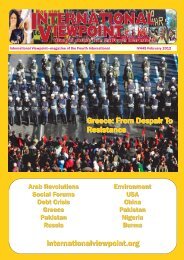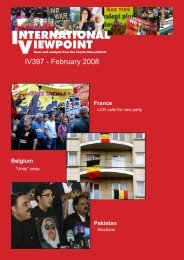here - International Viewpoint
here - International Viewpoint
here - International Viewpoint
Create successful ePaper yourself
Turn your PDF publications into a flip-book with our unique Google optimized e-Paper software.
A sign at a protest camp in Israel, saying "the market is free, we are slaves" (photo: Sergio Yahni,<br />
Alternative Information Center)<br />
Stanley Fischer, Governor of the Central Bank, reduces Israel’s social problems to four major phenomena:<br />
housing, cost of living, taxes and the government’s (in)ability to provide services demanded by the<br />
public. The Ministry of Finance maintains that the social demands of the protesters would cost some NIS<br />
60 billion. Media analysts and data published by both Israel’s Central Bank and the Ministry of Finance<br />
indicate that state coffers could positively respond.<br />
But the thousands of people camping out in the country’s squares and the hundreds of thousands who<br />
took to the streets on Saturday, July 30 are demanding a fundamental change in national priorities,<br />
the elimination of Israel’s neo-liberal policies and the restoration of the welfare state. Or, as the<br />
demonstrators themselves shouted: "revolution."<br />
Israel’s government lacks the political will to solve the problems highlighted by these protest, yet<br />
attempts to manipulate the protests and use them to deepen its neoliberal project.<br />
In a Jerusalem press conference on 1 August, Stanley Fischer declared that the solution to the housing<br />
shortage would include the creation of committees to bypass the existing planning processes, the<br />
approval of construction and a reformation of Israel’s real estate market. Between the lines: Fischer wants<br />
to hold large construction and contracting companies to fewer ecological and social constraints whilst<br />
simultaneously accelerating the privatisation of state lands.<br />
Today, 93% of Israel’s state lands are lands belonging to Palestinian refugees, and are thus protected by<br />
international guarantees issued by the United Nations since 1950.<br />
Similarly, Prime Minister Netanyahu is promoting the opening of the dairy market to imports in response<br />
to the high cost of food and the privatisation of public services.<br />
From the ranks of the social protest itself, however, comes a more radical suggestion: reduce the defence<br />
budget. On 31 July, during the monthly review with the Knesset’s Committee on Foreign Affairs and<br />
Defence, Chief of Staff General Benny Gantz, referred to this proposal. General Gantz said that "we<br />
must take into account the period in which we are, in which threats are most significant, and we cannot<br />
compromise our ability to act. In this t<strong>here</strong> can be no compromise."<br />
He was referring to the demand of the Palestine Liberation Organization (PLO) that the UN recognize an<br />
independent Palestinian state. According to Gantz, a Palestinian non-violent protest movement is set to<br />
erupt in September "in conflict against the wall or against the settlements." He added that now the army<br />
is acquiring weapons to respond to a mass Palestinian mobilisation and developing intelligence networks<br />
in order to prevent such a movement.<br />
At a meeting of the Likud faction in the Knesset, which took place on 1 August, Prime Minister calmed<br />
the concerns of his Chief of Staff: "Despite the protest, cutting the defence budget. Is not on the<br />
government’s agenda. "<br />
The thousands of people who have occupied public space in the cities of Israel are not a homogeneous<br />
group and have no recognised leadership. They reject Israel’s neoliberal regime, the privatisation of public<br />
services and the intimate relationship between capital and government. Beyond this, protesters do not<br />
agree on anything. The protest has no national leadership. No one protest camp represents another.<br />
Within the camps themselves, t<strong>here</strong> exists a consensual address to address problems and concerns. Any<br />
group of activists can make decisions like any other group, and the practice of conducting meetings in<br />
39









